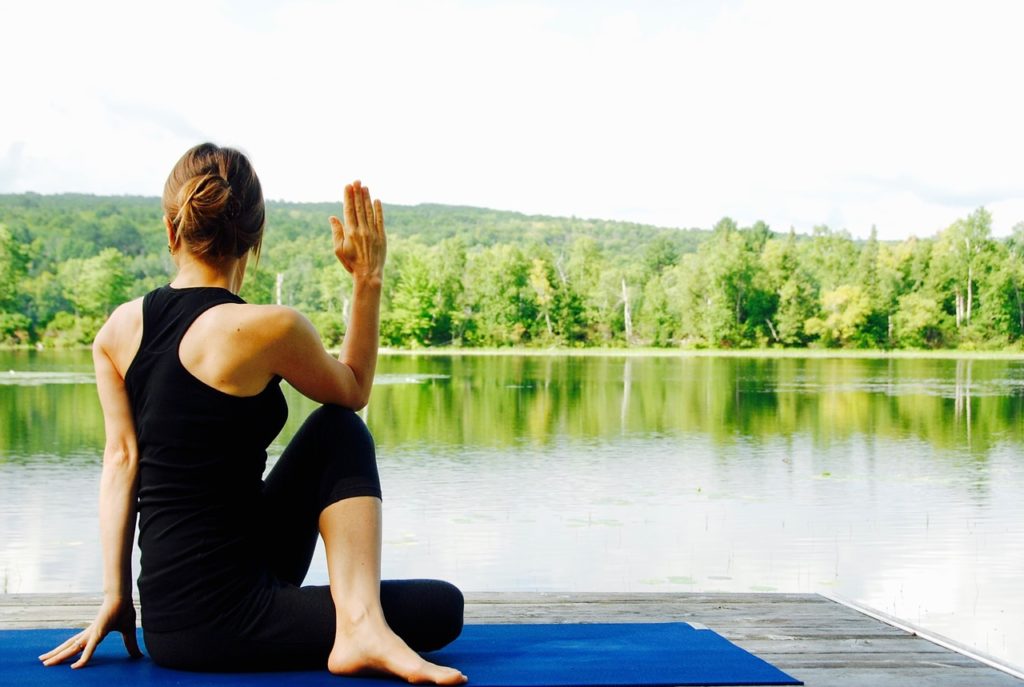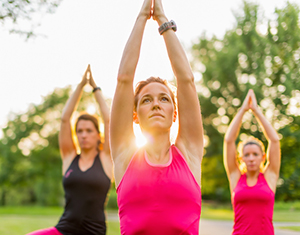- Calls to this hotline are currently being directed to Within Health, Fay or Eating Disorder Solutions
- Representatives are standing by 24/7 to help answer your questions
- All calls are confidential and HIPAA compliant
- There is no obligation or cost to call
- Eating Disorder Hope does not receive any commissions or fees dependent upon which provider you select
- Additional treatment providers are located on our directory or samhsa.gov
Easing Anxiety with Yoga

In a time in our nation and world where things have become more emotionally challenging and anxiety inducing, it is not surprising that practicing yoga has become so popular.
For over 3,000 years, the practice of yoga has been used to connect with the mind, body, and soul. The benefits that yoga has shown for easing anxiety draw new people to the practice daily, and with good reason.
Physical Benefits of Yoga for Anxiety
The act of engaging in a yoga practice allows individuals to take time and make space for themselves. In this space, individuals connect their breath to their physical movements as they flow through postures and connect mindfully to their bodies.
Yoga’s rhythm and movements show similar benefits to self-soothing techniques such as meditation, relaxation, or socializing with friends (1). In fact, yoga is proven to have impacts on the physical response our bodies have to stress, “reducing the heart rate, lowering blood pressure, and easing respiration (1).”
The simple act of connecting with the breath, which many of us do automatically without any thought, can decrease physiological distress.
Yoga and the Present Moment
 Yoga encourages us to stay alert and accept the present moment as it is without any attempt to judge it or change it. We feel the feelings that arise without becoming them.
Yoga encourages us to stay alert and accept the present moment as it is without any attempt to judge it or change it. We feel the feelings that arise without becoming them.
This ability to accept what cannot be changed and exist within it peacefully can change our perspective of our own thoughts, feelings, and behaviors outside of the practice.
Research shows that yoga can help individuals reframe and rewrite unhelpful or negative cognitions by giving them more awareness over those cognitions.
With this, “yoga can improve the psychological conditions for monitoring and managing stress and negative emotions, increase positive emotions, and help mental balance (2).”
Accepting the present moment is also important to coping with anxiety, as it encourages working within what is causing the anxiety, or viewing it differently, rather than allowing it to emotionally overwhelm you.
Taking Time for You
A final anxiety-fighting aspect of yoga is the reverence it encourages you to have for yourself and your body. Yoga is about taking care of every part of yourself, body, mind, and soul.
It is about listening to the needs of your mind and body and honoring these. In a culture where self-care is a buzzword often heard but not encouraged if it interferes with responsibilities, yoga reminds you that self-care is also your responsibility.
White-knuckling it through fear, anxiety, and worry is not a long-term solution. Yoga, however, can provide a safe, gentle, and lifelong practice that helps you calm your mind and connect with yourself in order to cope and to heal.
Resources:
Unknown (2018). Yoga for anxiety and depression. Harvard Mental Letter. Retrieved from https://www.health.harvard.edu/mind-and-mood/yoga-for-anxiety-and-depression.
Shohani, M. et al. (2018). The effect of yoga on stress, anxiety, and depression in women. International Journal of Preventative Medicine, 9:21.
About the Author:
 Margot Rittenhouse, MS, PLPC, NCC is a therapist who is passionate about providing mental health support to all in need and has worked with clients with substance abuse issues, eating disorders, domestic violence victims, and offenders, and severely mentally ill youth.
Margot Rittenhouse, MS, PLPC, NCC is a therapist who is passionate about providing mental health support to all in need and has worked with clients with substance abuse issues, eating disorders, domestic violence victims, and offenders, and severely mentally ill youth.
As a freelance writer for Eating Disorder Hope and Addiction Hope and a mentor with MentorConnect, Margot is a passionate eating disorder advocate, committed to de-stigmatizing these illnesses while showing support for those struggling through mentoring, writing, and volunteering. Margot has a Master’s of Science in Clinical Mental Health Counseling from Johns Hopkins University.
The opinions and views of our guest contributors are shared to provide a broad perspective on eating disorders. These are not necessarily the views of Eating Disorder Hope, but an effort to offer a discussion of various issues by different concerned individuals.
We at Eating Disorder Hope understand that eating disorders result from a combination of environmental and genetic factors. If you or a loved one are suffering from an eating disorder, please know that there is hope for you, and seek immediate professional help.
Published October 12, 2020, on EatingDisorderHope.com
Reviewed & Approved on October 12, 2020, by Jacquelyn Ekern MS, LPC

The EatingDisorderHope.com editorial team comprises experienced writers, editors, and medical reviewers specializing in eating disorders, treatment, and mental and behavioral health.

